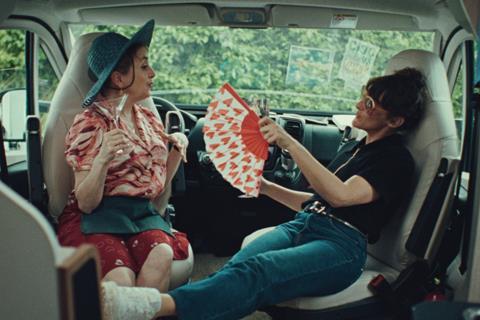French filmmaker Amélie Bonnin talks about how she infused music and memories into Leave One Day, the first debut feature to open Cannes Film Festival.

Amélie Bonnin’s Leave One Day may feature a dozen song-and-dance numbers but, its maker insists, “It’s not a musical.
“It’s a film with songs inside of it, she continues. “It’s a film that resembles life and the way we experience it through music. We listen to songs during important moments in our lives — birthdays, break-ups, when we think of someone who has died or to remember someone from our past. This approach that we have to music in real life — that is the heart of the film.”
Leave One Day, the first debut feature to open Cannes, expands on Bonnin’s 2023 César-winning short Partir Un Jour, about a man who returns to his hometown from Paris and revisits past memories. For the feature version, Bonnin has switched her lead character to a rising female chef on the cusp of opening a gourmet restaurant in Paris, who returns to her hometown when her father falls ill. There she reconnects with a former teenage crush and begins to question the direction her life is taking. Singer/songwriter Juliette Armanet stars alongside Bastien Bouillon, both of whom also headlined the short film, with their roles now reversed.

“There were subjects I wanted to address, like the choice to become a mother, how to balance career and relationships, getting older and carving out one’s path in life,” says Bonnin. “I didn’t want to be didactic but all these themes needed to be explored through a woman’s perspective.”
Roll call
Both the short and the feature were co-written by Dimitri Lucas, Bonnin’s partner in screenwriting and in life. Shot on location in the Grand Est region of France, it is produced by Topshot Films’ Bastien Daret, Arthur Goisset and Robin Robles and Les Films du Worso’s Sylvie Pialat and Benoit Quainon, with Pathé’s Ardavan Safaee and France 3 co-producing. Pathé release day and date in French cinemas, and Pathé International handles international sales.
A graduate of the prestigious Paris film school La Fémis, Bonnin cites an eclectic mix of creative inspirations, including directors Agnes Varda and Jane Campion “for their work and their existence in itself”, as well as contemporaries Julia Ducournau, Rebecca Zlotowski and Valérie Donzelli. “When they came onto the scene, I said, ‘Wow, a door is opening, there’s something very powerful happening’,” she recalls. “I hadn’t realised I was missing role models.”
While Bonnin will join the ranks of history-making female French filmmakers when Leave One Day premieres, she says: “I didn’t expect it and even now it doesn’t seem real. I told my producers not to share any rumours with me [about Cannes selection]. At 1am the night before the press conference, Sylvie Pialat called me and said, ‘Would you want to open?’ I said, ‘Open what?’ We were always hoping for a place in Cannes, but it had never occurred to me to open.”
Leave One Day’s soundtrack features a mix of songs from past decades alongside more modern tunes including hits from Celine Dion, French singer/songwriter Francis Cabrel and Belgian rapper Stromae. All of the musical sequences were shot live on set, with a score from Matthieu Sibony (Schmooze), P.R2b, Keren Ann, Zeidel, Thomas Krameyer, Germain Izydorczyk, Emma Prat & Theo Kaiser, and Chilly Gonzales.
“I gave them the screenplay, the song titles and our intentions and they worked to create the compositions,” says Bonnin. “The actors had the music in earphones and sang over it.”
Characters break into song mid-conversation but Bonnin’s aim was to keep the musical interludes simple. “I didn’t want to have big musical scenes with elaborate choreography. I wanted to keep it believable in terms of how the characters would move,” she says. “It was all choreographed, but to reflect the characters.”
The film’s original French title is taken from the name of a chart-topping single by 1990s French boy band 2BE3, which Bonnin says “marked an entire generation. It was a period when boy bands were at their peak and this song is one of the most well-known from that era [in France].”
While there are no plans currently to release a soundtrack to the film, the title track as sung by Armanet over the end credits will be available as a single.
While the songs may all be French, Bonnin hopes the emotions they evoke are universal. “It’s about asking questions like, ‘If I had taken this path instead, would my life have been different?’ That isn’t a French question — that is international.”

























No comments yet